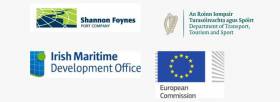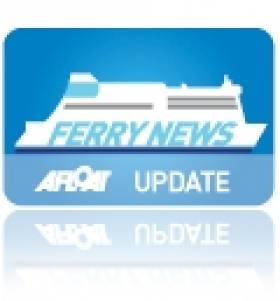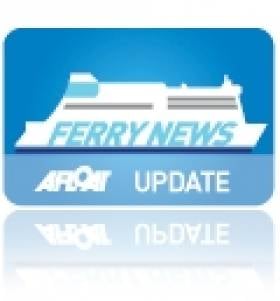Displaying items by tag: Motorways of the Seas
#ShannonEstuary - Shannon Foynes Port Company (SFPC) will host a 'Motorways of the Sea' seminar at the Savoy Hotel, Limerick City on this Friday, 18 May.
The event is free though in order to attend, registration in advance is essential to book a place. The seminar is a partnership between SFPC, IMDO Ireland, Department of Transport, Tourism & Sport (DTTAS) and the European Union.
For further information contact Evelyn Adams of SFPC by tel: (069) 73102 or email: [email protected]
The mid-west port has announced major plans to increase capacity through a €50m restructuring of Foynes Port as Afloat previously covered today.
LD Lines Launch First Ever Ireland-France-Spain Ferry Service
#IrelandSpain – As previously reported on Afloat.ie, LD Lines launches a new passenger and freight ferry service linking Rosslare Europort in Ireland, the France west coast port of St.Nazaire and the northern Spanish port of Gijón.
Click for LD lines contact details.
The new link sees the ro-pax ferry Scintu (2006/26,904grt) make her debut at midnight tonight with an inward bound sailing to Rosslare from St. Nazaire as part of the first ever ferry service linking Ireland, western France and northern Spain.
The new route is to forge new trading links combined with cost-saving advantages and environmental benefits for passengers and hauliers.
For the tourist market the link to Gijón makes destinations in Spain and Portugal easier than ever to drive to and for the freight market, by passing the UK landbridge, quicker access to and from the Continental mainland.
In addition the France West coast port of St.Nazaire is ideally located for popular French holiday locations such as Brittany, La Baule, La Rochelle and Bordeaux as well as providing easy accessibility for freight traffic between mainland Europe and now with the new service, Ireland.
Welcoming the new service, John Lynch, General Manager Rosslare Europort, said,"This new service, the first Ro Ro connection between Ireland, France and the Iberian peninsula, will open up new opportunities for trade between Ireland, France, Spain and Portugal, with the potential for inbound tourism to Ireland also benefiting significantly."
The new service will depart Rosslare on Fridays at 21:00 ; depart St.Nazaire to Gijón on Saturdays at 22:00 ; return from Gijón on Tuesdays at 22:00 ; depart St.Nazaire to Rosslare on Wednesdays at 23:59 with an arrival time in Rosslare on Thursdays at 21:15.
This represents a major extension of LD Lines' "Motorway of the Seas" Atlantic network, coinciding with other new services as previously reported, between Poole and Santander, which began in November 2013. A Poole – Gijón is to start in early January and the existing France – Spain route linking St.Nazaire and Gijón, which was introduced in 2010.
Christophe Santoni, CEO of LD Lines commented, "The new service will offer a value-for-money direct route between Ireland, France and Spain and in addition to making European destinations more accessible, will give the tourism and freight markets greater choice."
LD Lines' new network of ferry services will be operated by two sister ships Norman Asturias and Scintu. The modern Ro Ro and passenger vessels, built in 2008/2009 by the Visentini Italian shipyard, each have capacity for up to 500 passengers, 200 cars and 110 freight vehicles or 150 trailers. On board facilities include 120 cabins, bar, restaurant, shop and a full range of passenger entertainment is being developed and introduced in the months ahead.
Fares for the Rosslare – Gijón service start from €579 for a car and two passengers including cabin.
Rosslare – St.Nazaire fares start from €199 for a car and two passengers or €249 for a car and two passengers including cabin, noting this introductory fare on the Ireland-France route is limited to the first 200 car passenger bookings.
‘Proposed’ Cork-Spain Route Remains Under Review
In addition to services running out of Rosslare operated by Celtic Link Ferries and Irish Ferries and the alternative option of landbridge connections to Europe via the UK.
In the meantime, the Port of Cork will continue to be in dialogue with potential operators and investor's, however in the current climate it is proving more challenging to establish the service. Yet both the port authorities in Cork and Gijon remain committed in establishing the first direct Irish-Iberia passenger ferry route, with an update on the Spanish service due in early June.
Since 2008 the port authorities of Cork and Gijón, through the Promotion of Short Sea Shipping and Co-Operation with Small Medium Enterprise's (Proppose) an EU Inter-Reg project, have conducted feasibility studies into the service.
Interest in the service to date, has shown interest from Brittany Ferries, P&O Ferries and Transfennica, a Scandinavian based operator. It was envisaged that a ro-pax type of vessel would operate the 24-hour route to Gijón in Asturias, the region which forms part of Spain's northern 'Green' coast.
The route across the Bay of Biscay would be an attraction to freight hauliers, saving mileage and reduced fuel costs in addition avoiding a weekend ban to trucks travelling through France.
Last summer the ro-pax Norman Bridge started a new route between Nantes / St. Nazaire (Montoir-de-Bretagne) and Gijón, operated by GLD Atlantique. This route received support through the EU 'Motorways of the Seas' (MOS) programme to divert vehicle traffic from congested road-infrastructure and transferred to designated shipping routes, using larger and faster ro-pax vessels.
The route's opening was marked with a declaration signed by Dominique Bussereau, the French Minister of State responsible for Transport and his Spanish counterpart Magdalena Alvarez of the first of two Franco-Spanish MOS concept routes, starting with the 14-hour GLD Atlantique service.
- Irish Ferries
- port of Cork
- Celtic Link Ferries
- Fastnet Line
- P&O Ferries
- Brittany Ferries
- Ports and Shipping News
- Cork Harbour News
- RoPax
- Port of Gijón
- Proppose
- Motorways of the Seas
- MOS
- Transfennica
- CorkGijón
- Asturias
- 'Green'Spain
- Landbridge
- NantesSt.Nazaire
- GLD Atlantique
- Norman Bridge
- Cork Harbour































































